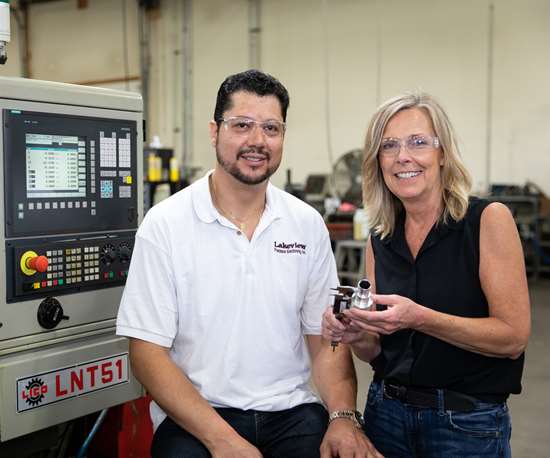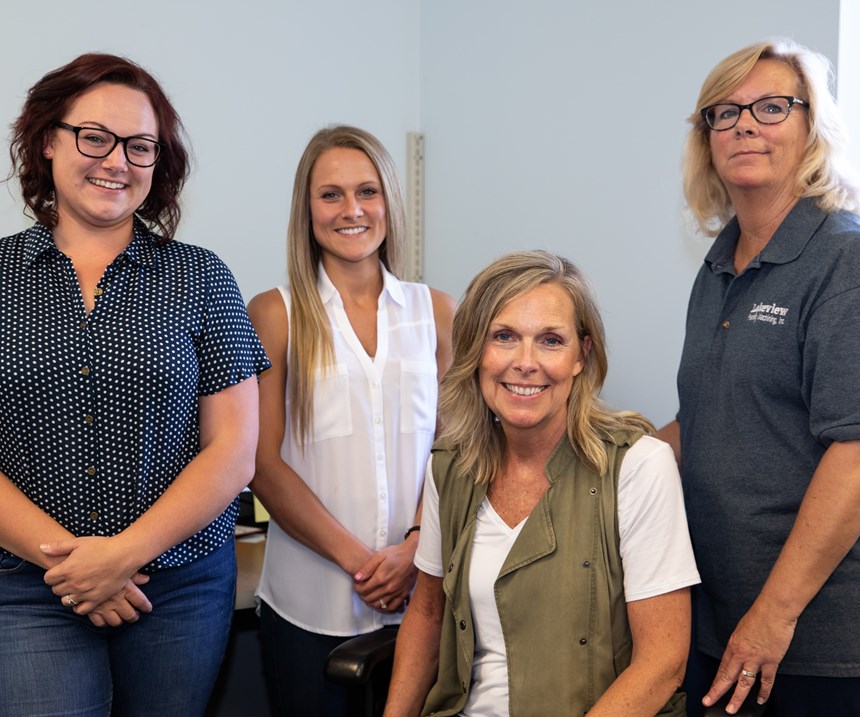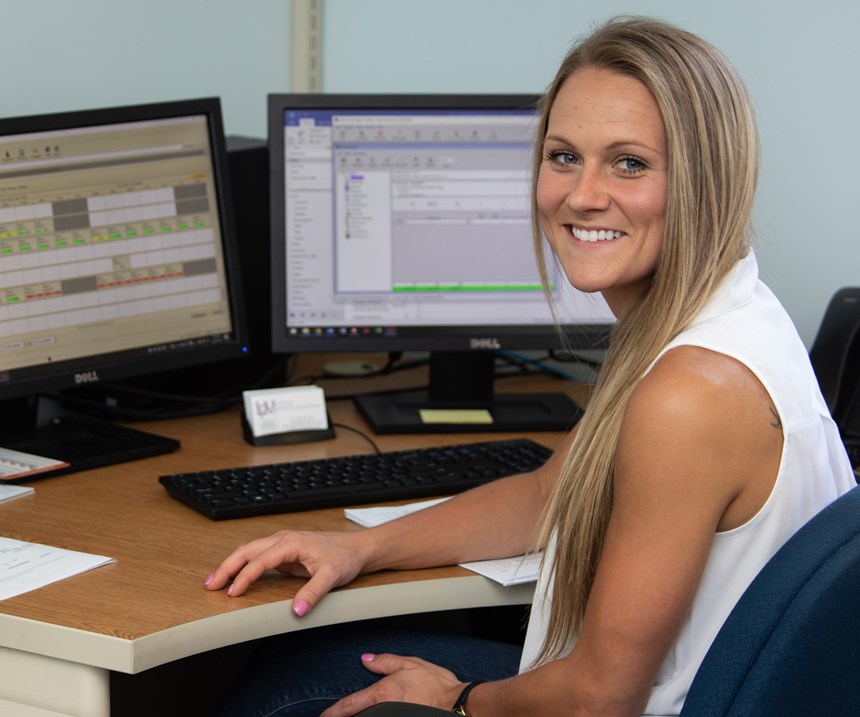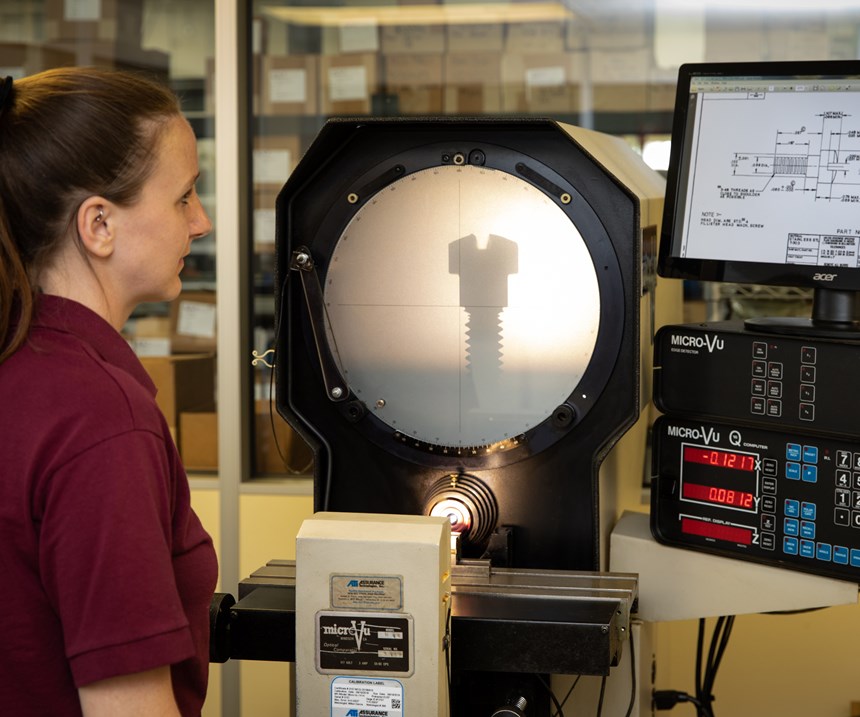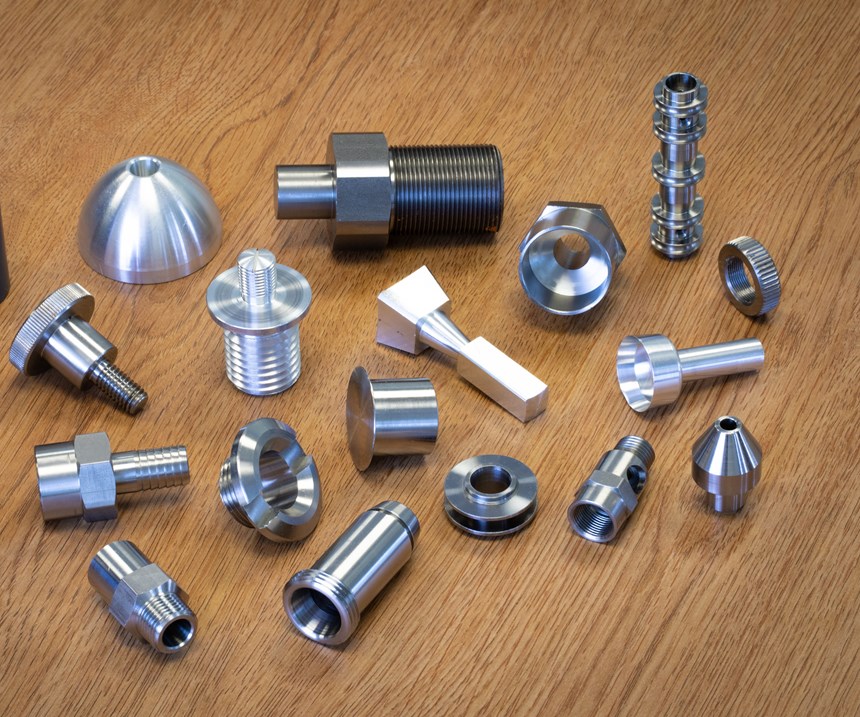Founded in the 1950s, Lakeview Screw Machine Products Inc. was a successful part making business when Debbie Sommers was hired. She worked and learned and moved through the organization and eventually became general manager. The shop’s small size and scope allowed her to participate in every aspect of the business. “The office wasn’t separated from the shop. I was out in the shop all the time,” she says.
Lakeview Screw Machine’s previous owner passed away in 2000, and in 2007 Ms. Sommers bought the company. Now called Lakeview Precision Machining Inc., the shop makes turned products for such industries as hydraulics, aerospace, water treatment, transportation, military, office equipment and injection molding.
Featured Content
Technology Transition
Ms. Sommers has been presiding over a transition from exclusively screw machine and secondary work to CNC machining with more flexibility, capability, throughput and autonomous operation. The company owns 11 CNC machines and 15 screw machines. Like many shops, Lakeview is gradually phasing out the screw machines, and as a consequence, the secondary operations department is also being eliminated. Secondary operations were a key element of the company’s production process when screw machine parts required further processing and finishing. As CNC machines with extended capabilities are phased in, much of the secondary operations department has become redundant.
From the start, Ms. Sommers focused on growing the business. “I didn’t want to own something and not have the ability to expand,” she says. “If you don’t have a plan for growth, you’re going to go out of business.” She set out a 10-year business plan that included buying and paying off new equipment in the first five years, then embarking on a growth strategy intended to assure that the company would retain present customers and grow into new markets. This required gaining production and operational capabilities.
“We bought our first CNC in 2007, a Swiss automatic lathe, and that was our direction into new modern technology,” Ms. Sommers recalls. The shop also sought a more productive replacement for its legacy screw machines. “We were looking for a direct replacement. We thought there were parts we could run more efficiently. We were running some parts in two operations on the screw machines, so we bought a machine to run them in one operation.”
After investigating a variety of alternatives, the shop chose a Lico LNT 51S-S3, a CNC multi-slide automatic lathe. The machine combines the simultaneous multi-tool operation capability of a screw machine with the flexibility of CNC control. Lico machines are sold and serviced in the U.S. by Absolute Machine Tools Inc.
The Lico machine at Lakeview features a standard spindle collet-chuck system and an eight-position servo tool turret with driven tools. Three to four X-Z in-feed, or compound, slides enable three to five tools to overlap and work simultaneously. A pick-off device consists of a hydraulically actuated, turret-mounted collet that is servo-driven synchronously with the main spindle. When front machining is complete, the collet holds the part for cutoff after which it is indexed to the opposite direction for back machining. The back machining tool platform allows for mounting as many as four gang toolholders or three live toolholders.
“We went with the Lico because it was similar to what we had, yet a major step up,” Ms. Sommers says. “We wanted a fixed headstock. The capacity on our former screw machines was 1 13/16 inches, and the Lico machine’s capacity is 2 inches, which made it a perfect direct replacement.” And the machine’s capability to run lights out means, in addition to eight hours manned, the shop gets an additional 12 or so hours unattended.
Screw machines are legendary for fast cycle times, but according to Ms. Sommers, the Lico machine is competitive. “Everything that came off the older screw machine had to be deburred or required a second operation, and the Lico solved that for us.”
According to plant manager, Nemesio Fernandez, the machine can apply four tools at the same time. “That’ll save you a whole lot of cycle time,” Mr. Fernandez says. “I’ve beat the cycle time on a lot of the former screw machine parts by half. Jobs I was running in 60 seconds, I run them on this machine in 35 seconds.”
The learning curve for multi-slide machine operation can be steep, but the shop’s main screw machine setup person was already accustomed to working with tool slides and turrets. “He learned it really well,” Ms. Sommers says. “He got creative with overlapping the slides and doing internal and external work at the same time.” The ability to program each part individually facilitates operational creativity.
Programming/ERP
Shop staff writes its own CNC programs and sends them to the machines with DNC4U software. Ms. Sommers says, “I know as we grow and get more machines, we’re going to have to do something different than manual programming.” However, she recognizes her operators’ desires to be creative with their program writing.
Lakeview Precision has ERP software and is working to take advantage of its capabilities. “We’re not using it to its fullest extent because we don’t have to yet,” Ms. Sommers says. “We’re going paperless in the office, and we want to do that in the shop.” The strategy is to start with one shop person as a beta tester. “We’re trying to capture everything we’re doing and document it, so we have a gauge going forward. We are working on ensuring our processes are nailed down, written and standardized, and then we can systematize them even more.” The shop’s inventory, workpiece stock, parts and production data are in the ERP system, but for now the shop doesn’t use it for scheduling, “Because it can’t react every day like we can.” Ms. Sommers would like to gain the capacity to enable customers to log in and check the status of their orders and request changes, if desired.
Ms. Sommers says the shop’s largest challenge is dealing with the 25 percent increase in sales experienced in 2017. “We had some growing pains last year. That’s why we needed to get the ERP system to where we could get the information out of it and be able to react or prepare. We want to be more proactive; we want to prepare so we can see ahead of time what we have and what we have coming in.”
Controlling Sales Swings
Lakeview Precision’s big increase in 2017 sales reflected the shop’s customer mix, Ms. Sommers says. “Our customer base is a little bit different. When everybody’s busy, we seem to be a little bit slower; when everybody’s slower, we seem to be really busy. A lot of the parts that we make are for consumer products, not business products. We want to even that out a little bit. We are looking at what percentage our sales are for different groups of customers and specifically target B2B customers.”
Growth Prospects
Lakeview Precision’s traditional concentration on turning products is a limiting factor, according to Ms. Sommers. “Right now, all we do is turning. We are not a one-stop shop for our customers. That’s why we can’t get in with the big boys. Performing only turning is a specialty, however, it is holding us back,” she says. “We are now looking at possibly going into fabricating, either joining forces with or purchasing another company down the road.”
Ms. Sommers is pushing Lakeview to become involved in parts production in markets with high growth possibilities. One example is parts for robotic applications. She believes there will be exponential growth in the technology over the next five years. “I’m going after some of those customers. That way, in a few years when they’re ready to grow, we’ll be ready to grow with them. We do have a couple of new customers on the horizon. I don’t want to give their names, but they are in the new age of automotive.”
Employee Development
Employee development is important to Ms. Sommers, both inside the walls of Lakeview Precision and outside within the community.
“We highly encourage and empower our employees to continue their personal development and education within our industry,” Ms. Sommers says. The company is actively working with Elgin Community College, which is offering personalized training classes. Ms. Sommers is also checking into classes offered by the PMPA and the Technology and Manufacturing Association. “Online classes are a great way to start,” she says. “We give employees the basics online and then we take them out on the shop floor and teach them. Continuing education is a part of the company’s culture. Virtually everyone started out here as a parts washer or maintenance person and moved up. There are high-school level initiatives, too. We had two interns from Bartlett High School last year, and three of them work for us in the summertime. We’ve had more again this past summer.”
Ms. Sommers also encourages her employees to get involved within the community and they do. She says the company is known as a community supporter. “We also donate to and support local fundraising events,” she says. Ms. Sommers believes that Lakeview Precision Machining Products is part of a community for a larger purpose than simply to make the owners more money.
Lakeview Precision Machining Inc. | 847-742-7170 | lakeviewprecision.com
A Family Team
Debbie Sommers’ three daughters work at Lakeview Precision Machining. Ms. Sommers’ sister and nephew are employees, too. The general manager’s daughter is a quality inspector, and a pair of brothers work in production. “Family relatives work here, but honestly, everybody is looked at as family,” Ms. Sommers says.
As she carried out her plans for the business, “Having a support team is so critical. If you think you’re a lone ranger, if you think you’re doing it on your own, look out. You have to have your team. It’s more than your team, it’s your family,” Ms. Sommers says.
A team effort has been essential in Lakeview’s progress. “Eleven years ago, being a woman in business was a big deal. I got invited to do things, and I had to say no. I just had to focus on my girls and focus on keeping my business afloat,” she recalls. “The team knew what I was up against, and they helped.
“As a woman general manager,” Ms. Sommers says, “I found that some people would talk to me as if I really didn’t know much. That’s old-school thinking, but that’s the way it was. That bothered me a little, but I didn’t let it stop me.”
Now, she says, “Some people look at me differently when they find out that I own the company. I don’t like that, either. Whether you’re an owner, or whatever it is that you do, you’re valued and you’re important.”
Ms. Sommers believes that balancing home and work helps her be more sensitive to employees and their needs. When I was raising my daughters, we couldn’t plan much growth at the company. I wanted to essentially maintain because I knew I had to be there for my daughters. Now they’re on their own, they’re doing their own thing, and it is our chance to grow.”
RELATED CONTENT
-
New Line of Swiss-Types for Job Shops Eyeing High-Production Work
Mazak now offers the Syncrex line of Swiss-type CNC lathes — its first — targeting machine shops getting into higher volume production of complex parts.
-
The Evolution of the Y Axis on Turn-Mill Machines
Introduced to the turn-mill machine tool design in about 1996, the Y axis was first used on a single-spindle, mill-turn lathe with a subspindle. The idea of a Y axis on a CNC originated from the quality limitation of polar interpolation and the difficulty in programming, not from electronic advances in controls or servomotor technology as one might commonly think.
-
Advancements in Thread Whirling Tooling Technology
Many understand the advantages of thread whirling on a CNC Swiss-type. However, new tooling technology for this thread-machining process can further improve cycle times and reduce cost per part.



